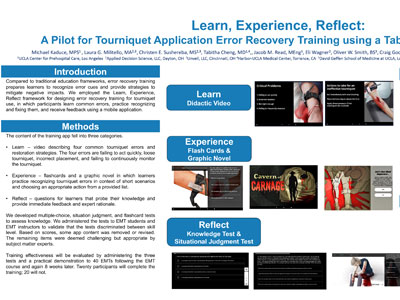ABSTRACTS
Learn, Experience, Reflect: A Pilot for Tourniquet Application Error Recovery Training Using a Tablet-Based ApplicationAuthor: Michael Kaduce, MPS, NRP | | Associate Authors: Laura G. Militello, Applied,Decision Science, LLC, Unveil, LLC Christen E. Sushereba, Applied,Decision Science, LLC, Unveil, LLC Tabitha Cheng, MD, Harbor- UCLA Emergency Department, UCLA Center for Prehospital CareJacob M. Read, Applied,Decision Science, LLC, University of Louisville Eli Wagner, Applied Decision,Science, LLC Oliver W. Smith, Unveil, LLC, Craig Goolsby, MD, MEd, MHCDS, FACEP, Harbor-UCLA Medical Center, Torrance, CA David Geffen School of MedicineJennifer Winner, Air Force Research Laboratory, 711th Human Performance Wing
Introduction Compared to traditional education frameworks, error recovery training prepares learners to recognize error cues and provide strategies to mitigate negative impacts. We employed the Learn, Experience, Reflect framework for designing error recovery training for tourniquet use, in which students learn common errors, practice recognizing and fixing them, and receive feedback using a mobile application. Objective To evaluate the use of the Learn, Experience, Reflect framework for error recovery training for tourniquet use. Methods Content of the training app fell into three categories: Learn, Experience, Reflect. The Learn category included video describing four common tourniquet errors and restoration strategies. The four errors are failing to act quickly, loose tourniquet, incorrect placement, and failing to continuously monitor the tourniquet. The Experience category includes flashcards and a graphic novel in which learners practice recognizing tourniquet errors in the context of short scenarios and choosing an appropriate action from a provided list. The Reflect category includes questions for learners that probe their knowledge and provide immediate feedback and expert rationale. We developed multiple-choice, situation judgment, and flashcard tests to assess knowledge. We administered the tests to EMT students and EMT instructors to validate that the tests discriminated between skill level. Based on scores, some app content was removed or revised. The remaining items were deemed challenging but appropriate by subject matter experts. Training effectiveness will be evaluated by administering the three tests and a practical demonstration to 40 EMT students following the EMT course and again 8 weeks later. Twenty participants will complete the training; 20 will not. Results Data collection is ongoing, but initial Time 1 results indicate that the training is effective, with students scoring better on tests after completing the training. There is no difference between groups on the practical demonstration. Full results are expected by September 2023. Conclusion Initial Time 1 data indicates that the Learn, Experience, Reflect framework is useful for designing effective app-based error recovery training for tourniquet use. Time 2 results will determine whether the error recovery training improves retention of tourniquet errors and mitigation strategies over time.
|

